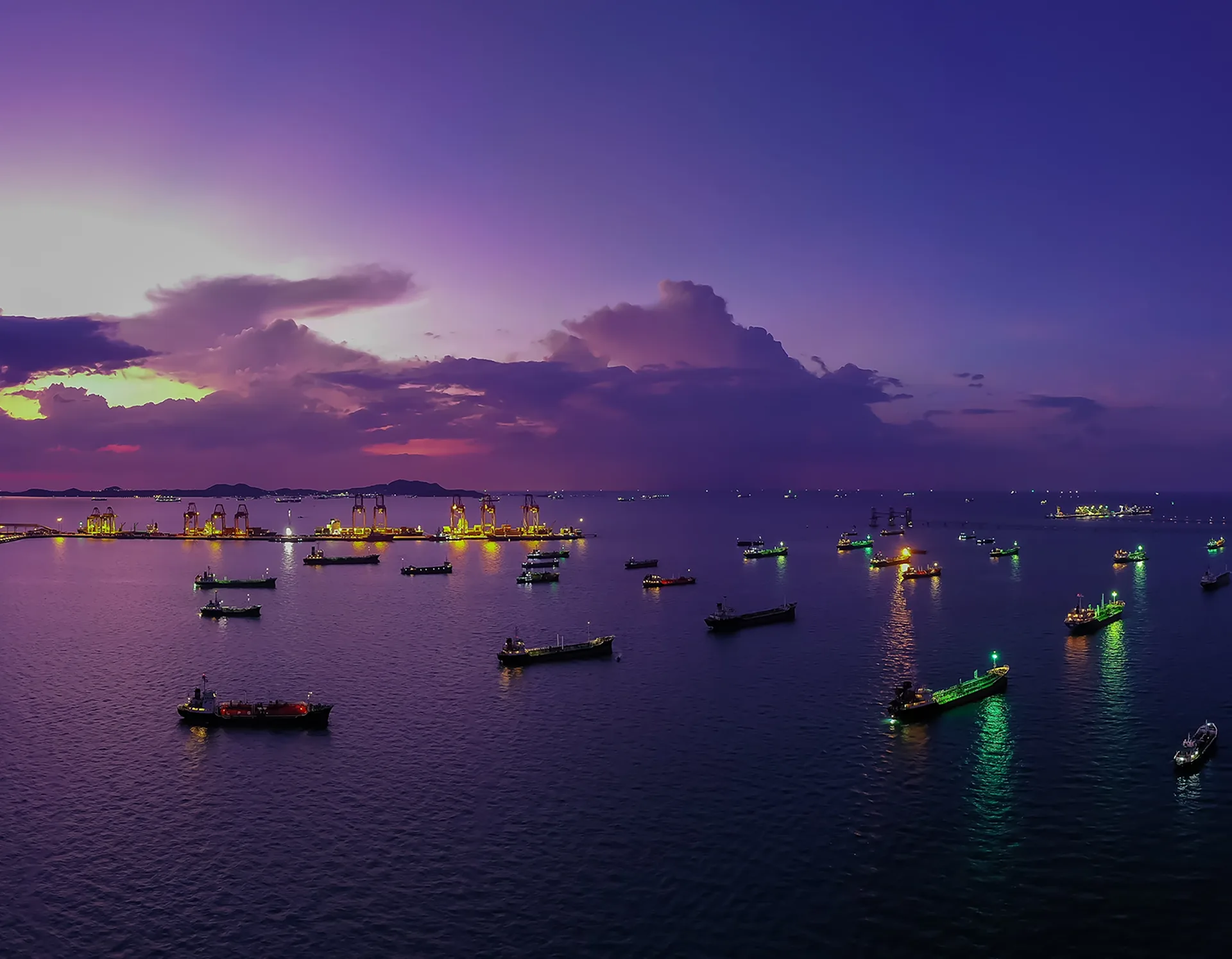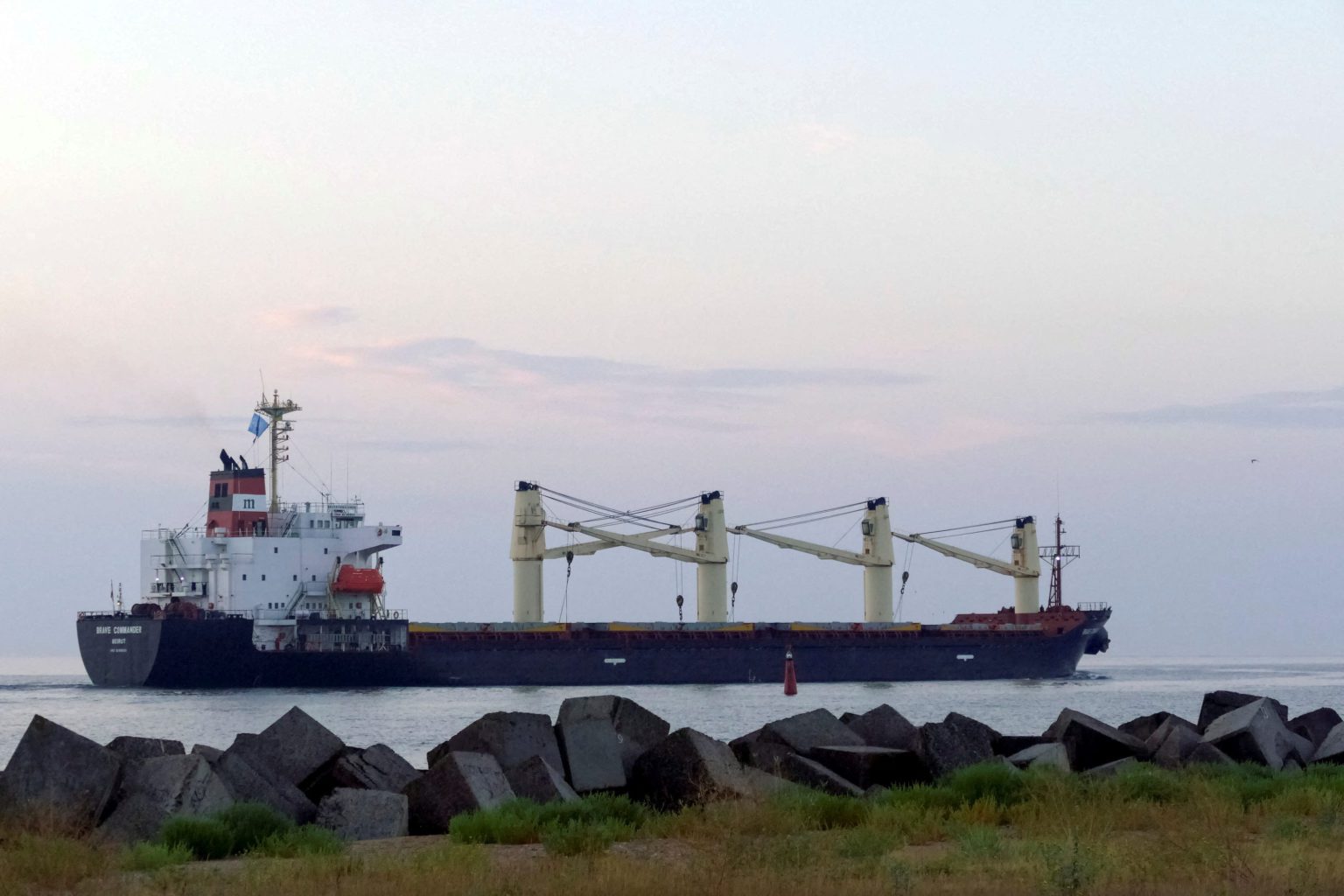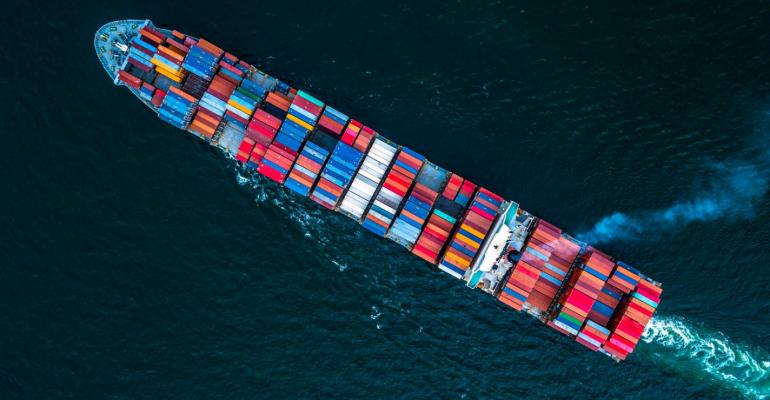The UK Maritime Trade Operations (UKMTO) warned of rising tensions in the Gulf Region and urged vessels transiting the Arabian Gulf, Gulf of Oman and Straits of Hormuz to transit with caution. Following the latest outbreak of hostilities between Israel and Iran that commenced on 13 June 2025, a number of nations, including the UK and Greece, have advised their merchant shipping fleets to avoid transiting through the Gulf of Aden and to log all voyages through the Strait of Hormuz.
At the time of writing, shipping traffic continues to flow through the Strait of Hormuz, but it is reported that shipowners are beginning to exercise caution and are choosing to avoid the Red Sea and the Persian Gulf. Many companies and vessels are preparing to reroute in the light of the military strikes.
Iran is now also said to be considering the closure of the Strait of Hormuz which, if it happens, will severely impact the global oil trade and the container trade.
The Strait of Hormuz connects the Persian Gulf and the Arabian Sea. About 1/5 of global oil shipments pass through the Strait of Hormuz and, so far in 2025, the Strait has handled about 34% of all seaborne-traded oil. While several neighboring countries have invested heavily and opened new pipelines to bypass the Strait, several other countries (Kuwait, Qatar, Bahrain and Israel) have no alternatives routes through which to ship their goods.
The Strait is regulated by the UN Convention on the Law of the Sea of 1982. The Traffic Separation Scheme (TSS) recognized by the UN’s International Maritime Organization, is in operation and consists of two, two-mile wide shipping lanes: one for incoming traffic and one for outgoing traffic. The area is divided between the Iranian and Omani territorial waters. It is understood that the vessels could still proceed via alternative routes through the UAE and Oman.
These latest incidents, and the threatened closure of the Strait of Hormuz, could disrupt global supply chains and a spike in oil and natural gas prices is to be expected. They also have potential legal implications for the shipping industry, some of which we consider below.
Deviation
Article IV, rule 4 of the Hague/Hague-Visby Rules allows the carrier to make a deviation from the agreed route to save life or property at sea or any reasonable deviation. The charterparty may also incorporate an express liberty clause, giving the carrier the right to deviate from the contractual voyage on various listed grounds. Even where there is no express provision, the shipowner/master has an implied right to deviate if it is necessary to avoid danger to the vessel.
The terms of the relevant charterparty should be checked to determine whether they permit deviation and the scope of the contractual liberty to deviate. In general terms, however, a deviation must be reasonable if the carrier is to avoid liability for any losses that result. In the context of the potential hostilities, the carrier will have to demonstrate that it was necessary for the safety of the vessel or cargo. Factual assessment of flag, vessel and cargo in relation to safety needs to be undertaken; given the evolving risk situation, the outcome of that assessment can change rapidly. Furthermore, a charterparty term granting liberty to deviate is not automatically incorporated into the bills of lading such that there would be an equivalent right to do so under the bills. It may not, therefore, bind cargo interests although the carrier could rely on Article IV, rule 4.
Force majeure/frustration
The majority of international carriers have force majeure (FM) provisions in their applicable terms and conditions or other contracts with their customers. Such FM clauses may allow them to either terminate voyages or to reroute them in specified circumstances.
The extent to which these carriers can legitimately rely on the relevant FM clauses will depend on the wording and scope of the applicable clause. Whether or not the FM clause will be held to apply to the current hostilities and any closure of the Strait of Hormuz will also depend on the applicable law and jurisdiction of the contract. Different jurisdictions have different attitudes to and interpretations of FM clauses.
FM as a civil law concept does not form part of English common law, but an exceptions clause in the charterparty may specify the events which will qualify as exceptions to the carrier’s obligation to proceed by a route which is not the usual and customary course. The closest English law equivalent to FM is frustration. A party claiming frustration of the contract of carriage will have to show that the Israel/Iran attacks and situation in that area have fundamentally changed the parties’ performance obligations under the contract of carriage and have made further performance impossible, illegal or radically different from that which was originally contemplated.
The fact that contractual obligations have become more burdensome or expensive to perform is unlikely to frustrate the contract of carriage.
Safe port
The charterparty may incorporate an express or implied safe port warranty. This encompasses both physical and political safety and safety of approach. A safe port warranty has a carve-out for “abnormal occurrence.” Whether the current hostilities amount to an abnormal occurrence for these purposes may depend on whether they are foreseeable. (The Chemical Venture [1993] 1 Lloyd’s Rep 508 180.) Given the current situation, they are arguably to be deemed foreseeable.
If the charterer nominates a port that is deemed unsafe, the owner will be entitled to reject that nomination as invalid. Where a time charterer makes a valid nomination, but the port becomes unsafe before the vessel arrives, the time charterer must nominate a new port.
By contrast, a voyage charterer may not be able to do so without the owner’s consent. Instead, the voyage charterparty will normally provide for the vessel to proceed to the nominated port or as near to that port as she “may safely get”. Where the alternative port is very far from the nominated port, then there may potentially be an argument that the charterparty is frustrated because performance is radically different to that which was originally contemplated by the parties.
Where the parties to the charterparty agree that the cargo should be delivered at an alternative port, it is important to check whether the bill of lading names a specific discharge port. If the bill of lading does not allow for discharge at a port other than the one specified, delivery at an alternative port may constitute a breach of the bill of lading contract.
War risks
A charterparty will usually incorporate an express provision allowing for cancellation/ termination in the event of an outbreak of war or war-like situation.
Industry standard provisions include CONWARTIME and VOYWAR. War risks clauses differ in scope and effect and should be considered carefully to determine what are the owner’s liberties under the provision. Where there is a chain of charterparties, the war risks provisions may not be back-to-back and this may complicate matters.
Generally speaking, if a vessel is being ordered to proceed to a war risk area, the war risks provision may provide that the owner has the right to refuse the order if it is reasonable to do so. It will be for the Master, in his reasonable judgment, to decide whether the vessel, her cargo or her crew may be, or are likely to be, exposed to war risks. The test is objective rather than subjective, see the Triton Lark [2012] EWHC 70 (Comm), where the NYPE charterparty incorporated CONWARTIME 1993.
Whilst some war risks clauses will result in exclusion of the charterer’s safe port warranty, others will not. Furthermore, unless the off-hire clause in the charterparty expressly provides otherwise, hire may continue to run during any periods of delay associated with war risks.
If the war risks clause is invoked and the cargo is discharged at an alternative port to the one originally nominated, the owner may be entitled to additional freight depending on whether or not the substitute port is within the range specified in the charterparty. However, some war risks cover incorporates detention or diversion expenses.
Where charterers order the vessel to, or through, an area of heightened war risk, the vessel’s standard insurance cover will not generally be sufficient, and extra premia will be levied to cover the additional risk. While the owners are responsible for paying the standard insurance premia, liability for the additional cover will depend on what the charterparty provides.
The Supreme Court decision echoes the obiter view in the Paiwan Wisdom [2012] EWHC 1888 (Comm), a case in which the charterparty contained the CONWARTIME 2004 clause, which provided that the owners may refuse to proceed to a place which was dangerous on account of a war risk, and a trading limits clause which stated that “Passing Gulf of Aden always allowed with H&M insurance authorization.” The Court emphasized that the applicable CONWARTIME 2004 provision had to be read in the context of the charterparty as a whole, including the express provision indicating owners’ agreement to pass through the Gulf of Aden. The owners could not, therefore, refuse to pass through the Gulf of Aden.
Comment
The Israel/Iran attacks and Iran’s threat to disrupt global trade by closing the Strait of Hormuz would present a number of legal, commercial and practical challenges for carriers, charterers and cargo interests. Those potentially affected should keep a close eye on developments and should review their contracts closely to determine their rights and liabilities in this context.
Source: Hill Dickinson



